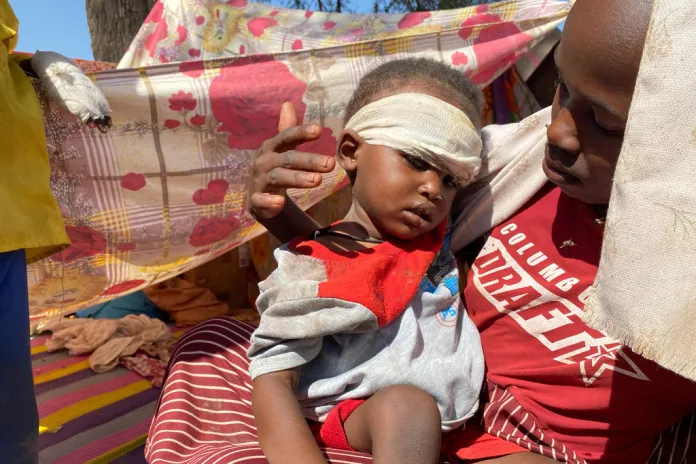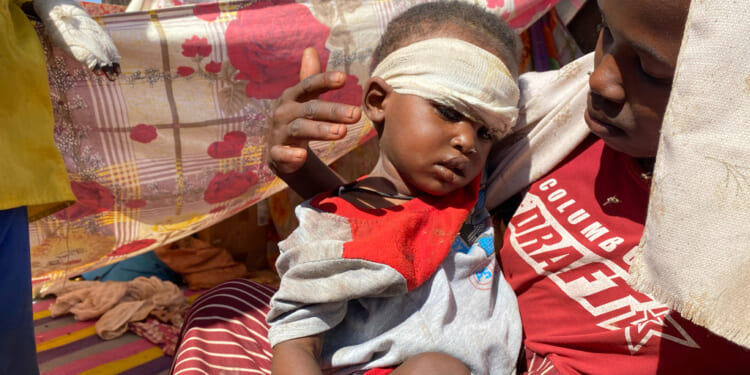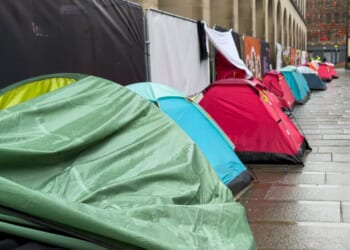The massacre that ensued after Rapid Support Forces took control of the Sudanese city of El Fasher is greater in scale than initially believed, with a top RSF commander estimating that at least 7,000 civilians were murdered.
A joint investigation from Sky News, Sudan War Monitor, and Lighthouse Reports utilized video and satellite image analysis, testimonies from eyewitnesses, and several sources close to the matter to uncover the scale of the massacre that ensued last week after the Sudanese Armed Forces evacuated the key city of El Fasher, the last major population center controlled by the SAF in Sudan. One of the biggest revelations from the investigation was an admission of massive casualties from those within the RSF, with a top RSF commander with knowledge of operations within the city estimating that the paramilitary forces murdered at least 7,000 civilians after it fell.

Alaa Nugud, spokesman for the RSF’s political administration TASIS, denounced a supposed fake media campaign around the “Al Fasher liberation” to Sky News, calling the 7,000 death toll “totally rubbish.”
“Never happened that TASIS forces or any of its constituents killed civilians based on ethnic background; on the other hand, this is what was done by SAF and the Muslim Brotherhood National Congress Party doctrine during their 39 years of rule,” Nugud said, when presented with the investigation’s evidence of massacres.
“SAF’s military intelligence was igniting these ethnic clashes throughout years they used religion to flame war in south Sudan and used racism and ethnicity to ignite war in Darfur,” he added.
However, Nugud then appeared to admit to RSF atrocities, but blamed them on the SAF for supposedly starting the war.
“The atrocities are consequences of this war, not the cause of the war. So to stop all these atrocities, we have to stop the war, and this is not there in the SAF agenda,” he said.
“Could they not provide or grant safe passage to civilians? The reality is that the insurance of the continuation of the war and spoiling of all peace platforms. … The continuation of this war is the main cause of all atrocities,” Nugud added, further boasting that RSF forces had evacuated 800,000 civilians outside of El Fasher.
The investigation also uncovered details of the chaotic withdrawal of SAF troops from El Fasher after an 18-month siege. While SAF Commander-in-Chief Abdel Fattah al-Burhan portrayed the episode as a heroic and daring withdrawal, with a small number of troops left behind to cover the retreat, soldiers interviewed described it as a chaotic scramble with no communication to those on the front lines.
“The division commander had left the garrison. They completely abandoned us, and we were suddenly surrounded 26-to-1 in the morning hours. Suddenly, everything collapsed on us in the defence. We asked what was going on and were told everyone fled,” an SAF soldier told Sky News.
“Shortly after, bombs started falling on us. Brig. Gen. Adam, the artillery commander, refused to withdraw, saying that the division commander had already withdrawn without informing him of the order. The brigadier general, six colonels, and a naval colonel were also captured,” he added.
Other civilians interviewed backed up the account, saying that soldiers on the front line seemed to be unaware of a withdrawal until after it happened.
“There was no coordination over withdrawal, and it seemed to be a surprise to the remaining fighters on the front line. Some were leaving the city, and others were fighting battles with the RSF,” one civilian said.
The man said that he then witnessed rampaging RSF forces killing anyone they came across after they triumphantly entered the city.
“The streets were covered in bodies. I saw it for myself. The RSF came into the city and butchered everyone they found. They did not discern between a child, a civilian, or the elderly; they executed everyone, a full genocide,” he said.
Around 200,000 civilians were left in El Fasher by SAF forces. With the information blackout, most are unaccounted for, believed to either be dead or taken hostage. Several accounts emerged of RSF fighters contacting the families of hostages to ransom them.
Hundreds were believed to have been killed at a time in killing fields around the city, with videos proudly posted across social media by RSF soldiers showing mounds of corpses and point-blank executions.
A source in El Fasher told Sky News and the investigators that in one instance, only 200 of a group of roughly 2,000 captives arrived at a nearby displacement shelter, suggesting many were murdered along the way.
Another survivor said that the RSF troops basked in sadism, executing random civilians and forcing the witnesses to bury them.
“They would select people and execute them in front of us and then say ‘Bury your brother’ and we would cover them with soil. I saw them kill 18 people with my own eyes, and then people had to bury them with their bare hands,” a survivor said.
Sudan has been engulfed in a bloody civil war since April 2023, when a power struggle between RSF leader Mohamed Hamdan Dagalo, also known as Hemedti, and SAF leader al Burhan escalated into open conflict. After suffering a major setback in March by losing the capital of Khartoum, the RSF regained the initiative in the following months with foreign help, culminating in their victory at El Fasher.
The scale and targeted nature of the killings, together with previous massacres, have led some to argue that the RSF is committing genocide. Among these is the United States, which sanctioned RSF leaders last year over the accusations.
The capture of El Fasher has split the country in two, with the RSF controlling the western half and the SAF controlling the eastern half. Neither appears to have the immediate capability to take more territory, setting the stage for the possible partition of the country.

















